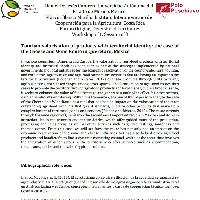Descripción
- In various countries in America and Europe, the valorisation of agri-food products with territorial identity and historical depth has been seen as one of the strategies implemented by national governments and local initiatives for the economic reactivation of the countryside. Rural tourism, and within this, agrotourism and agri-food tourism, are activities that are having an impact on the territorial activation (Boucher and Riveros, 2017) of these products through visits to farms, agribusinesses, specialised shops, among other spaces. The formulation of agri-food routes thus seeks to promote the territory through agri-food products and local dishes, but in a broader sense, it seeks to enhance the value of food heritage and generate a multiplier effect for other sectors, such as handicrafts or catering. Within this framework, the aim of this paper is to analyse the case of the Cheese and Wine Route as a tool that has had an impact on the valorisation of the most outstanding agri-food products that give it its name, but also other products that make up a complex basket of territorial goods and services (Blanco and Riveros, 2010). The route extends through the wine region of Querétaro - the second most important region in Mexico - and its main attraction lies in the wineries and cheese dairies, which offer guided tours of the production, processing and sales areas, as well as other services such as guided tastings, samplings and themed events. From this case, we will see how the route has not only had an impact on the economic reactivation of the wine and cheese industries but has also helped other agri-food products and handicrafts to find a dynamic marketing channel, which at the same time involves the integration of other actors in the territory who offer services such as accommodation, restaurants, guides and the sale of typical products.
